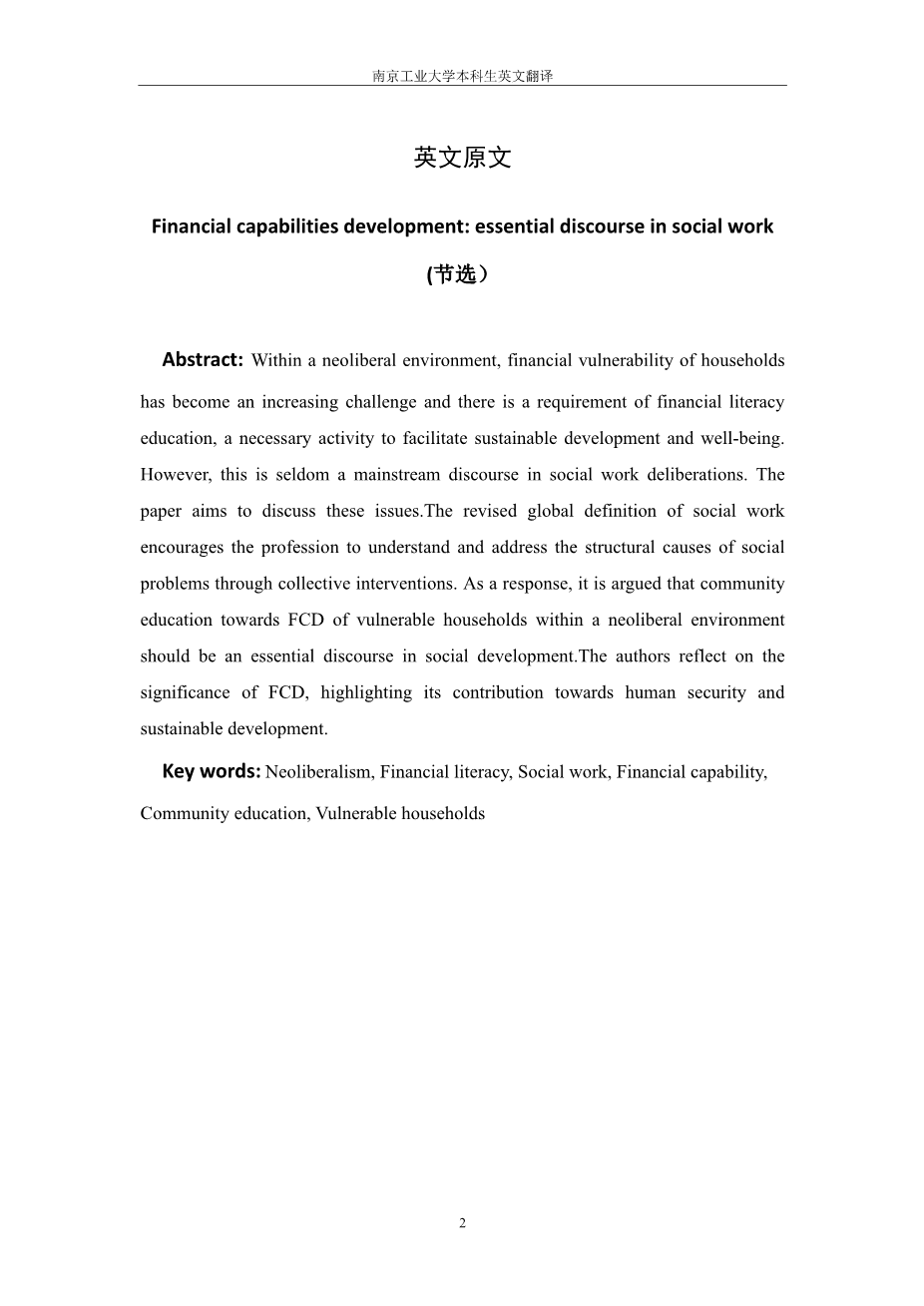
英语原文共 9 页,剩余内容已隐藏,支付完成后下载完整资料
目录
A conceptualisation of financial literacy 6
Using community education for the facilitation of financial capabilities 7
引言 12
结论 15
英文原文
Financial capabilities development: essential discourse in social work
(节选)
Abstract: Within a neoliberal environment, financial vulnerability of households has become an increasing challenge and there is a requirement of financial literacy education, a necessary activity to facilitate sustainable development and well-being. However, this is seldom a mainstream discourse in social work deliberations. The paper aims to discuss these issues.The revised global definition of social work encourages the profession to understand and address the structural causes of social problems through collective interventions. As a response, it is argued that community education towards FCD of vulnerable households within a neoliberal environment should be an essential discourse in social development.The authors reflect on the significance of FCD, highlighting its contribution towards human security and sustainable development.
Key words: Neoliberalism, Financial literacy, Social work, Financial capability, Community education, Vulnerable households
Introduction
The environment in which social work finds itself and the communities it serves has undergone significant changes in the last two decades. A converging neoliberal socioeconomic agenda is impacting greatly on global and local matters of vulnerability and social justice (Abramovitz, 2012; Spolander et al., 2014). The advancement of neoliberalism, which prioritises economic gains over human dignity, has ushered in individualism, competition and commodification of care as the primary principles of economic advancement. Poverty is exasperated in an environment which holds individuals responsible for their own well-being despite the growing chasm of structural, economic and geographical inequality (Harvey, 2007). Within a neoliberal approach, the production of inequality to facilitate competition is maintained as a progressive means towards economic strengthening. This holds the belief that such economic strengthening would eventually trickle down to liberalise the poor (Davies, 2014). Through the prioritisation of profit and economic logic, there has been a global regression in social welfare, opportunity and citizenship power. Instead, communities have become subject to the logic of the market (Pratt, 2006); the financial system has become the primary centre of redistributive activity through the outright promotion of debt incumbency (Harvey, 2005; McGarity et al., 2018). Within this context, communities have become increasingly vulnerable to economic shock and exploitation.
Financial literacy has long been recognised as a significant capability for impoverished households globally. However, within a neoliberal context, this has become ever more necessary for sustained livelihood and well-being (McGarity et al., 2018). Although financial literacyeducation has been taken up by several institutions and organisations, it can come with underlying agendas and motivations towards participation within the neoliberal financial environment. This is often at the detriment of vulnerable households, including the promotion of specific financial products and further entrapment. This paper argues that there is a particular role for social work in the community-based provision of Financial Capabilities Development (FCD) for vulnerable households (Lein et al., 2015). This needs to become an essential part of a developmental social work discourse, particularly within a neoliberal environment (McGarity et al., 2018; Sherraden, 2017).
This paper uses as its foundation Engelbrechtrsquo;s (2015) “Integrative review of community education to facilitate financial capabilities of vulnerable households”. The authors build on his six-part argument through the additional consideration of neoliberal impact and significance for both social work and communities in postulating the importance of FCD as a social work activity. Expanding on Engelbrechtrsquo;s (2015) six-part review, the authors offer a seven-part argument for financial literacy community education within todayrsquo;s neoliberal climate. This seven-part argument will be presented as such: sketching the contexts of financially vulnerable households; conceptualising financial literacy; reflecting on perspectives on and approaches to financial literacy as a fundamental capability; offering a theoretical foundation of community education as a practice model in social work to develop financial capabilities; reviewing prevailing themes of FCD programmes; critically analysing the implications of a neoliberal environment for the changing role of social work; and concluding with reflections on the significance of FCD, in its contribution towards human security and sustainable developm
剩余内容已隐藏,支付完成后下载完整资料
资料编号:[261288],资料为PDF文档或Word文档,PDF文档可免费转换为Word
以上是毕业论文外文翻译,课题毕业论文、任务书、文献综述、开题报告、程序设计、图纸设计等资料可联系客服协助查找。
您可能感兴趣的文章
- 晚年丧偶和已婚妇女的休闲活动和抑郁症状外文翻译资料
- 认知行为与心理动力人际治疗对进食障碍的影响:一项关于缓解期患者特征和改变在进食障碍特异性和一般精神病理学中的作用的荟萃分析外文翻译资料
- 社区和疗养院里老年人的精神需要外文翻译资料
- 日本社区协会的参与和正式志愿者外文翻译资料
- 社会工作组织中的变革型领导与社会工作者更替的关系外文翻译资料
- 社区参与现实世界:新形势下的机遇与陷阱治理空间外文翻译资料
- 提升在社区独立生活的长者的生活满意度:看护者对志愿者的看法外文翻译资料
- 非典型就业群体失业保障制度的研究外文翻译资料
- 日本长期护理保险和综合护理外文翻译资料
- 新农合与城镇居民医疗保险并轨研究外文翻译资料


